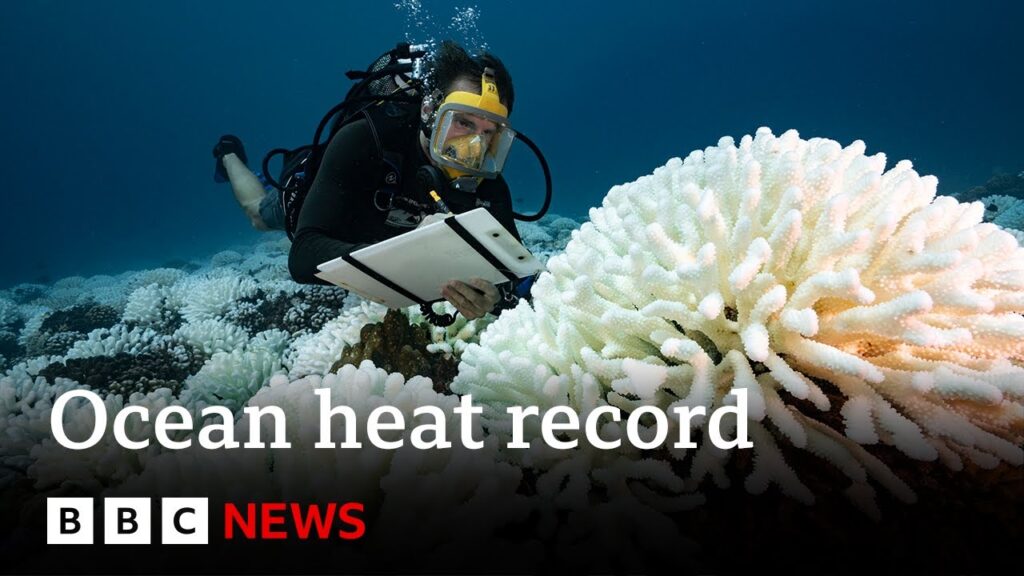Oceans Hit Hottest Average Temperature Ever Recorded, Endangering Ecosystems on Which We Depend
ENVIRONMENT, 7 Aug 2023
Juan Cole | Informed Comment - TRANSCEND Media Service
5 Aug 2023 – The world’s oceans hit an average temperature of 20.96°C (69.728°F ) this week, according to the Copernicus Climate Change Service. It is the highest average ocean temperature ever recorded, beating a previous record from 2016. So reports Rosie Frost at Euronews.
Climate scientists at the Intergovernmental Panel for Climate Change (IPCC) have found that from 1982 to 2016, the number of marine heatwaves doubled in frequency, plus they last longer and are more intense. Such long term secular trends are sure signs of an underlying causation, in this case the heat-trapping carbon dioxide that humans are spewing into the atmosphere when they drive their gasoline cars or heat their buildings with coal or fossil gas.
The extra heat this year is also contributed to by the El Nino phenomenon in the waters of the South Pacific, which is cyclical. The Atlantic is especially hot in part because the usual Saharan dust hasn’t blown over it as much this year. The dust particles reflect sunlight and without them the sun rays go straight to the ocean surface and heat it. These accidents of history, however, are is being layered onto a climate that has already been heated up by 1.2°C over the past century and a half because of the burning of fossil fuels.
The water off Key Largo in Florida has reached hot tub temperatures of over 100 °F this summer, contributing to the extensive bleaching and die-off of coral reefs, which play a vital role in the marine ecosystem, offering marine life safe space for resting, spawning and hiding from predators. Coral reefs also foster microorganisms upon which much marine life feeds. Healthy corals are in a symbiotic relationship with algae, but they expel the algae, turn white and die when it gets too hot for them.
Hot ocean water does not absorb as much carbon dioxide. Since our “carbon budget” derives from the forecast that the oceans will gradually absorb all the extra CO2 we have spewed into the atmosphere, that budget may be less robust if the oceans get unexpectedly hot faster than predicted.
Microscopic organisms such as phytoplankton may also not thrive under these hotter conditions, but they are the food base for lots of other marine life. So worries NOAA. They also produce half the world’s oxygen.
I mean, we are talking about a source of food for hundreds of millions of people.
Hot surface water also produces more intense and longer-lasting hurricanes and typhoons, which feed on warm water beneath them. Hot surface water encourages evaporation, so that there is more water vapor in the air above the water. Water vapor is also a greenhouse gas and contributes to higher temperatures. But it also can be precipitated by storms on land, causing massive floods.
The El Nino is still in its beginning phase and is so far weak, so scientists expect that in August a new record will be set for sea surface temperature. In fact, the rest of our lives will consist of one heat record after another being broken. It won’t be pleasant.
_____________________________________________
 Juan Cole is the founder and chief editor of Informed Comment. He is Richard P. Mitchell Professor of History at the University of Michigan and author of, among many other books, Muhammad: Prophet of Peace amid the Clash of Empires and The Rubaiyat of Omar Khayyam.
Juan Cole is the founder and chief editor of Informed Comment. He is Richard P. Mitchell Professor of History at the University of Michigan and author of, among many other books, Muhammad: Prophet of Peace amid the Clash of Empires and The Rubaiyat of Omar Khayyam.
Tags: Climate Change, Ecological Degradation, Environment, Global warming, Oceans
DISCLAIMER: The statements, views and opinions expressed in pieces republished here are solely those of the authors and do not necessarily represent those of TMS. In accordance with title 17 U.S.C. section 107, this material is distributed without profit to those who have expressed a prior interest in receiving the included information for research and educational purposes. TMS has no affiliation whatsoever with the originator of this article nor is TMS endorsed or sponsored by the originator. “GO TO ORIGINAL” links are provided as a convenience to our readers and allow for verification of authenticity. However, as originating pages are often updated by their originating host sites, the versions posted may not match the versions our readers view when clicking the “GO TO ORIGINAL” links. This site contains copyrighted material the use of which has not always been specifically authorized by the copyright owner. We are making such material available in our efforts to advance understanding of environmental, political, human rights, economic, democracy, scientific, and social justice issues, etc. We believe this constitutes a ‘fair use’ of any such copyrighted material as provided for in section 107 of the US Copyright Law. In accordance with Title 17 U.S.C. Section 107, the material on this site is distributed without profit to those who have expressed a prior interest in receiving the included information for research and educational purposes. For more information go to: http://www.law.cornell.edu/uscode/17/107.shtml. If you wish to use copyrighted material from this site for purposes of your own that go beyond ‘fair use’, you must obtain permission from the copyright owner.
